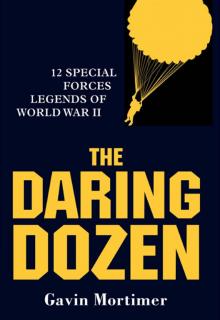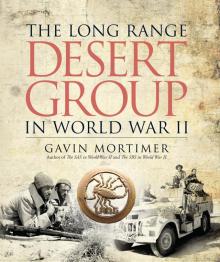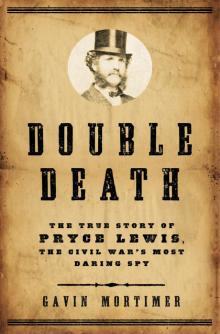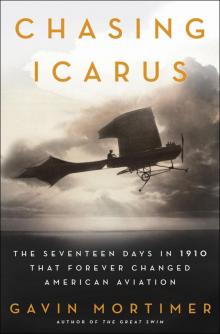- Home
- Gavin Mortimer
Double Death Page 23
Double Death Read online
Page 23
which without cause they have digged for my soul.
Let destruction come upon him at unawares;
and let his net that he hath hid catch himself:
into that very destruction let him fall.
False witnesses did rise up;
they laid to my charge things that I knew not.
They rewarded me evil for good to the spoiling of my soul.
. . .
The Reverend Dr. Woodbridge returned at six o’clock the next morning, Tuesday, April 29. Webster was dressed in a white cotton shirt and a black coat. The two men prayed and talked, and together read some passages from the Bible. The rector implored Webster to be strong, reminding him that he had nothing to fear from a just and loving God. Woodbridge remained with the condemned man for an hour. When the time came for him to depart, he shook Webster’s hand and suggested he spend his final minutes in prayer.
Soon a carriage driven by Winder’s men arrived, and Webster was taken from his cell by George Freeburger. Without the aid of crutches, Webster had to lean heavily on his jailor for support. They rode west along Broad Street, following the course of the railroad toward Camp Lee. It was a fine day, and the air was scented with violets and hyacinths. Daffodils burst from the roadside verges, and the meadows beyond the hedges of ailanthus that lined the mile-long route were golden. Behind the carriage the sun climbed above the spires of Richmond’s thirty-three churches.
The carriage passed a guard of soldiers and pulled up outside the headquarters of the camp commandant, Colonel John Shields. In prewar days the headquarters had been the office of the president of the Richmond Central Agricultural Society. Eighteen months earlier the society had hosted the Prince of Wales during his visit to the showground. To the rear of the headquarters was a long building occupied by quartermasters, surgeons and drillmasters, and the enclosed space in front of this building was where the officers played marbles in the cool of the evening. Enlisted soldiers lived in tents and washed in a creek on the edge of the camp.
Inside the headquarters Webster’s manacles were removed, and he was left alone with the Reverend Dr. Moses Hoge, the padre of the camp. They prayed and talked, and at ten minutes past eleven Freeburger returned. Webster was shackled once more, and then Hoge and Freeburger assisted him into the carriage. It was a short ride to the gallows, no more than 250 yards, but it took five minutes because the ground was still soft from the spring rain. From inside the carriage Webster saw the wooden coffin at the foot of the scaffold.
A large crowd of Richmonders had gathered, and soldiers pushed them back as Webster climbed down from the carriage. He mounted the scaffold steps unaided. In the branches of the oak trees that overhung the gallows perched a gang of boys, their young eyes wide with curiosity. Waiting for Webster on the scaffold was the hangman, a fearsome fellow with a “white beard, long and flowing … face hard, features large and firm, eyes gray, cold and cruel.” His name was John Caphart, once a hunter of runaway slaves and now the city’s executioner. In Richmond and throughout Virginia they called him “Anti-Christ Caphart.” He bound Webster’s feet as Hoge invoked the Divine Mercy. The rope was adjusted around the prisoner’s neck, under his brown beard flecked with gray. George Freeburger asked Webster if he had anything to say. Webster looked at Hoge and thanked him for his kindness.
Caphart removed Webster’s silk dress hat and slipped a black cap over his head. He stepped back three paces, grasped a wooden lever and pulled. The trap opened, and Webster fell. There was a heavy thud, then gasps and shouts from the crowd. Caphart looked through the trap and saw the empty noose and underneath Webster twitching on the ground. Two soldiers pulled Webster to his feet and dragged him up the gallows steps as the prisoner moaned, “I suffer a double death.”
Caphart adjusted the cotton noose, looped it once more around Webster’s neck and tightened it with a brutal jerk. Webster gave an anguished cry: “You are going to choke me this time.” Caphart stepped back and pulled the lever. There was no thud. The mute crowd watched as Webster kicked the air in his death throes. Caphart removed his hat and wiped his brow with his lucky red bandana. For fifteen minutes the correspondents of the Richmond newspapers stood and chatted in front of the gallows as Webster’s body gently swung to and fro. Then they began to move away. It was nearly luncheon, and they had to write their copy for the morning issue.
The newspapermen had agreed that Webster’s gallant death would not be edifying for their readers. The people of Richmond expected a Yankee, particularly one as perfidious as Webster, to die with more disgrace.
The Richmond Examiner related how Webster had arrived at Camp Lee “making use of horrid oaths and treating the subject of his approaching death with scorn and derision.” Then in the final few minutes his bluster vanished and instead “he wept constantly and his strength seemed to fail him utterly. He trembled like an aspen and was unable to stand alone.” The paper added: “It is said, on taking leave of him, Webster’s wife exhorted him ‘to die like a man’; in how far he obeyed her exhortation our readers can judge.”
The Dispatch concentrated less on the manner of Webster’s death and more on his profanity, describing how he had insisted Reverend Woodbridge “read the psalm of David, invoking vengeance on his enemies. He [Woodbridge] refused and Webster grew indignant, causing the clergyman to take an early departure.” The Enquirer also published details of this final prayer meeting, during which Woodbridge’s “endeavors to bring about a pious state of mind in the unmitigated villain only met with ill-mannered responses, [and] the only approach he made towards resignation was a request that the Rev. gentleman would read him that psalm of David which invoked curses upon his enemies.”
The Reverend Dr. Woodbridge read the newspapers with mounting irritation. Having deliberated on the response, he retired to his office and wrote a letter to William B. Allegre and Nathaniel Tyler, the owners of the Richmond Enquirer.
Gentlemen:
Will you please allow me to correct a statement in your paper respecting Webster, the spy. I ask it for the sake of his wife. In all my interviews with him he was uniformly grateful and respectful … the psalm to which reference is made is the 35th. He pointed it out to me the day before. Considering it as indicating a state of mind not desirable, I told him that if he entertained any unkind feelings towards the others he must abandon them, as an indispensable qualification for forgiveness from God. He said, however, that the Psalm suited his state of mind, not that he wished any evil to others; and that he freely forgave others their offences against him as he wished forgiveness from God. This Psalm he did not ask me to read on the morning of his execution, though I noticed that the leaf was turned down.
Geo. Woodbridge
Will those editors in the city please to publish this who have given similar accounts.
*The transcripts of Webster’s trial, and of Lewis’s and Scully’s, were never found. In all probability when Richmond fell to Union troops in April 1865 and Judah Benjamin ordered stacks of wartime documents to be burned, they were among them. None of the Richmond papers carried extensive reports on the trial (held in camera), but the Dispatch summarized the court’s proceedings in its edition of April 30, 1862.
*Lincoln’s decision was prompted by the revelation that far from the seventy-three thousand men McClellan claimed to have left in Washington to defend the capital, there were fewer than thirty thousand. McClellan had included in his wildly inaccurate figure the twenty-five thousand men of Major General Nathaniel Banks’s army stationed in the Shenandoah Valley, and he had also blatantly deceived his president, counting some divisions twice.
*Pinkerton later claimed that when he told McClellan about Lewis and Scully, “his sympathy and sorrow were as acute as though the men had been joined to him by ties of blood.” Given that the general—who had met neither Lewis nor Scully—had the fate of tens of thousands of men in his hands, it seems unlikely he would have lost much sleep over the pair.
C H A P T E R T W E N T
Y - T H R E E
“It Was Not War, It Was Murder”
MOST OF THE NORTHERN PAPERS carried the belated news of Webster’s death, the first execution of a spy by either side in the war. The New York Post noted the fact and asked the rhetorical question: “What if the federal government should commence hanging spies?” The Burlington (Iowa) Hawk Eye related the facts surrounding the case, boasting that Timothy Webster was well known in Iowa, having helped solve many cases over the years, and that some people might remember his charming wife and children. With breathtaking irresponsibility the paper then told its readers that “the report that he had his wife with him, and that she was in Richmond with him at the time of Webster’s execution, is a matter very easily understood and explained by those who understand the workings and intricate machinery of the secret police service. We doubt not that some female, passing as his wife, was with him, and that when it became known to him that his fate was sealed, he revealed his true name, that his friends would know him.”
The New York Times and Chicago Tribune reprinted the report from the Richmond Dispatch, the same one in which Webster was alleged to have imprecated all manner of curses on the heads of every Southerner. Contained toward the end of the Dispatch’s spurious article—and also reproduced by the Northern papers—was a paragraph concerning the fate of the other three detainees. Mrs. Webster, “arrested along with her husband as a spy,” was still in Castle Godwin but would “no doubt be sent out of the Confederacy” before long. Not so Pryce Lewis and John Scully whom, the paper said, could expect to remain imprisoned for a good many more months. The Dispatch mocked the two poltroons, claiming that they were to blame for Webster’s death because “they let the cat out of the bag on him after their conviction.”
In the same week that the Northern newspapers were publishing news of Webster’s death, a copy of the Boston Herald dated April 16, 1862, reached the pretty market town of Shrewsbury, just inside England’s border with Wales. It had been six years since Elizabeth Lewis last saw her favorite son, Pryce, but she exchanged the occasional letter with him and knew he was working as a detective. Nevertheless, she had no idea as to the exact nature of his work, even less that he was actively engaged in the Civil War. And now she read the crushing news that, according to the Boston Herald, Pryce had been executed.
She had lived in Shrewsbury for a couple of years, just her and Thomas, who had risen above his rank to become a solicitor. It was Thomas who, on May 14, wrote on his mother’s behalf to Charles Adams, the United States’ minister to Britain. On a sheet of paper banded in black as a sign of mourning, Thomas Lewis repeated the erroneous claim made in the Boston Herald of April 16 that his brother had been executed and pleaded for more information. He then asked Adams to “kindly inform me how I am to act in the matter and if my poor brother has left any personality [sic] behind him (which I have no doubt he has), how I am to obtain it. He has left a poor broken-hearted (widow) mother to lament his loss. Hoping you will excuse me for the liberty I have thus taken.”
John Scully’s brother was closer at hand when he heard that his sibling was in rebel hands. From his home in Carlisle, Indiana, P. B. Scully wrote to Lord Lyons, the British ambassador in Washington. Lyons forwarded the letter to Frederick Cridland, along with a note instructing him to “inquire into the matter and make a report to me upon it.” It took two months for Lyons’s note to reach Cridland, but the acting consul replied in detail, apologizing first that “the arduous duties at this office and the innumerable cases involving the liberty of British subjects prevented my reporting the case at the time.” Cridland then elaborated on the arrests, his interview with Mr. Benjamin and Mr. Randolph, and the subsequent commutation of the sentences. As far as he was aware, Cridland concluded, “the prisoners are still confined in jail.”
Lewis read with disgust the “grossly prejudiced” accounts of Timothy Webster’s execution in the Richmond papers. He knew them to be untrue because George Freeburger had delivered a detailed description of the hanging that same afternoon. Of course Webster had been afraid, but he’d gone to his death like a man. Lewis attached no blame to himself for what happened, nor did he harbor much rancor toward John Scully, with whom he was reunited a couple of days after Webster’s death. Scully was young and not particularly bright. He should never have been sent South. Instead Lewis reserved his vehemence for Father McMullen, whom he believed had pressured Scully “to make a full confession to save himself,” and for the man he blamed most of all, the fool who had landed them “deep in the mud.” As Lewis and Scully sat in their cramped cell, sweating in the stifling May heat, the Englishman turned to his companion and laid the blame for their plight squarely at the feet of Allan Pinkerton, “for it was his downright lack of judgment, or worse, that brought us here.”
A little more than a week after Timothy Webster’s execution, May 8, John Beauchamp Jones penned a plaintive entry in his diary: “Norfolk and Portsmouth are evacuated! Our army falling back! The Merrimac is to be, or has been, blown up!”*
Every day rumors swept through Richmond that the Yankees would soon be at the city’s gates. People promenading among the linden trees in Capitol Square wore creased brows and asked one another if there was any truth in the report that General McDowell’s army was coming south to reinforce George McClellan’s already vast force. The pessimistic professed solemnly that it was only a matter of time before the bell in the tower on Capitol Square tolled to warn of the enemy’s arrival. Some inhabitants began to flee Richmond, at least those who could, the wealthy and the influential. John Beauchamp Jones packed off his family to Raleigh, North Carolina, on Friday, May 9. Jones admitted he was ashamed at this “flight from the enemy … [but] no one scarcely supposes that Richmond will be defended.”
That same evening, a courier delivered a message to President Jefferson Davis as he hosted a reception at the Confederate White House on Clay Street. He read the message in his office, then returned to the drawing room and his guests. He passed his wife, Varina, en route and whispered, “The enemy’s gun-boats are ascending the [James] River.”
The next morning Davis ordered his wife to North Carolina. John Beauchamp Jones’s family and Mrs. Davis were among the first to leave, the first drops of a summer shower that soon became a deluge. “The panic began some days later,” wrote Mrs. Davis, “and it was pitiable to see our friends coming in without anything except the clothes they had on, and mourning the loss of their trunks in a piteous jumble of pain and merriment.”
For Richmond’s poor there was no alternative but to remain in a city that seemed to be disintegrating before their eyes. The chins of profiteers doubled, tripled, quadrupled as they grew fat on the misery of others; few people could afford either meat or fish, so most grew thin within their summer clothes.
People took to the street to demonstrate at the injustice, but it had no effect; nor did General Winder when he tried to curtail the profiteering with the imposition of a maximum tariff for various foods. The farmers and fishermen responded by refusing to come to market, forcing Winder to back down.
Some found solace in black humor, and a favorite joke of the day was that shoppers left home with their money in their baskets and returned with their goods in their purses. In public Jones bore a look of stoic fortitude, like the others who refused to run. Men and women took their lead from John Letcher, Virginia’s governor, who told his people he would never surrender Richmond. He feared no Yankee, be he McClellan or Lincoln.
Each morning Richmonders woke wondering if today would be the day the Yankees came. Every afternoon after work scores of men and women—John Beauchamp Jones included—trooped up the top of Hospital Hill, north of the city, from where the guns could be heard. Sometimes as they stood on the hill listening to the sound of battle they saw the Union observation balloon, Constitution, ascending in the distance. Inside the basket was twenty-nine-year-old Thaddeus Lowe, the pioneer of aerial military espionage.
Lowe had been fascinated with aeronaut
ics since childhood, and his first ascent in a balloon was in 1856; by the time war broke out he was rivaling John Wise as America’s preeminent balloonist. On June 18, 1861, Lowe had risen from the grounds of the Columbian Armory (present-day site of the National Air and Space Museum) and from a height of five hundred feet above Washington telegraphed the White House from his basket, telling Lincoln he was indebted to him for his ENCOURAGEMENT FOR THE OPPORTUNITY OF DEMONSTRATING THE AVAILABILITY OF THE SCIENCE OF AERONAUTICS IN THE MILITARY SERVICE OF THE COUNTRY. That evening Lowe spent the night at the White House explaining to the president the potential of balloons as a reconnaissance tool. By the end of July 1861 Lowe was the chief aeronaut in the U.S Army Balloon Corps (the corps would have seven balloons, each with a mobile hydrogen gas generator), and the following month he made the first of twenty-three ascents in a thirty-four-day period, gathering intelligence on the Confederate positions on Upton’s Hills and around Fairfax Courthouse, as well as the roads to Arlington and Alexandria.
McClellan was one of the first officers to go aloft with Lowe, and he made sure the Balloon Corps was used during the Peninsula Campaign. The Confederates hadn’t the resources to launch their own aeronautical rival, but their reaction to the innovation was to produce one of their own: military camouflage. They disguised military encampments so they couldn’t be seen from the air, and in other cases they painted logs black to look like cannons.
Toward the end of May Richmond braced itself to be invaded. The Dispatch did little to allay people’s fear, warning in its edition of May 24 that “our Northern brethren are now engaged in an assiduous endeavor to restore the Union and set the Stars and Stripes afloat in Richmond, by laying plans to murder and rob all of our people who may wish to prevent the consummation of their dearly-cherished project.” Women sat in their drawing rooms sewing sandbags, or they “gathered at St. Paul’s Church to prepare bedding for the hospitals.” Plans were drafted for the evacuation of all women and children should the city come under bombardment; it was agreed to burn all tobacco and cotton stocks to prevent their falling into Yankee hands. On May 28 George Randolph, secretary of war, ordered the removal of official documents to the railroad depot, and the following day General Winder had the temerity to close the city’s gambling houses to prevent the soldiers straying from their posts.

 The Daring Dozen
The Daring Dozen The Long Range Desert Group in World War II
The Long Range Desert Group in World War II Double Death
Double Death Chasing Icarus
Chasing Icarus